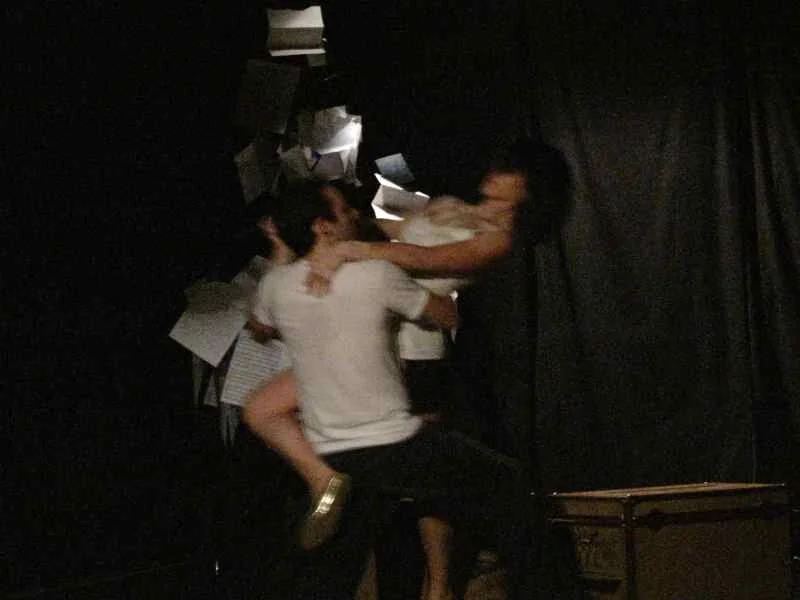THE PIANO TUNER
Based on the novel Der Klavierstimmer by Pascal Mercier
Translated + adapted for the stage by Birgit Schreyer Duarte with Natalie McCallum and Annette Schreyer
SummerWorks Performance Festival 2009
the Cameron House on queen st., Toronto
6-16 August 2009
English Language Premiere
CAST + CREATIVE TEAM
Performed by Miranda Calderon and Tyler Séguin. Co-Created by Annette Schreyer. Dramaturgy Natalie McCallum. Set and Costumes Claudia Kada. Lighting Brendan Gilhuly. Sound Dario Del Degan. Choreography Rebecca Hope Terry. Stage-Manager Beth Duffus. Poster Design Louis Schreyer Duarte.
ABOUT THE PLAY
A famous Italian tenor is shot dead on a Berlin stage. The twin children of the suspect, a legendary piano tuner and failed composer, return home, to understand what happened. Years earlier, escaping their incestuous love for one another, they cut all family ties. Suddenly reunited, the twins are forced to overcome their speechlessness. Determined to find the truth, they recount their unique intimacy, but also the disintegrating effect their father’s music had on the family. Through remembering and writing they begin developing their individual identities.
DIRECTOR’S NOTES
Living apart from my own identical twin was my original incentive for this project. As soon as I started reading Pascal Mercier’s novel Der Klavierstimmer, I recognized that I had never come across literature that describes the complex sense of self of twins this truthfully. Of course, our strivings as twins to become individual personalities were never nearly as dramatic or sensational as those in Mercier’s novel. Nevertheless, we feel a strong sense of identification with the story and its core issues. Growing up as a twin is like living with a mirror, not so much visually, but emotionally and mentally: the familiarity of one another’s thought patterns and experiences creates a unique sense of shared identity that can be both threatening and incredibly enriching. We can relate to the twins idiosyncrasies such as their ability t virtually read the other one’s mind, their secret language, and their tendency to refuse other people access to their own safe world. In the other hand, we suffer similarly from the “necessity” of living apart from each other, and our persistent longing for a life together, as Patrice and Patricia do in the novel.
Thinking through the notion of identity (be it in an academic, artistic, per personal context), I find it striking that the words identical and identity, while derived from the same root, can in fact describe opposites. In The Piano Tuner this dilemma becomes a leitmotiv for the siblings’ condition. Their life-long desire to be one, to be “identical”—not only in the biological sense of the term but also in their perception of one another—is precisely what turns into a threat to forming their individual identities. From this perspective, being identical then rather means living with a non-identity. Bound by the ties of this non-identity that their perfect union created, Patrice and Patricia cautiously try out a tool to counter this lack of demarcation: the act of writing. An intriguing dynamic occurs: the more they open up to each other in their increasingly intimate notebook entries for each other, the more defined their senses of self become. In a process not unlike Patrice and Patricia’s, working on translating, adapting and directing this material with a creative team became one possible way for my sister and me to express and process the paradox that lies in the bonds of twin-hood. Birgit Schreyer Duarte
"a wonderful show - beautifully directed, excellent use of the space, a series of unforgettable stage images, and the story was effectively conveyed as much through gesture as words. Very moving."
"amazing work! Your performers were wonderful (I was really floored by both of them) and you did such a great job with the story-telling; really interesting use of the space, fantastic music choices and using the 2 actors for multiple roles ~ all very intriguing."
"It is a lovely and difficult story and I thought you put it in to dramatic form very well. I was most impressed with the acting and was very very pleased with your directing ideas. It was a fantastic use of the space and you really had the two actors playing off of each other well. The music was also magnificent. I congratulate you on this huge achievement and I hope there will be many many more to come."
"Saw The Piano Tuner tonight and wanted to compliment you on your use of the Cameron House - I greatly enjoyed your direction with action throughout the house, and thought that the chemistry between your two actors was very compelling."
"I attended the opening night, and loved it. The casting is terrific. The script was excellent, as was the use of music and dance choreography. A sexual taboo is approached delicately. Early in the play there is a searingly erotic moment on the dance floor involving no more than the touch of hand to foot, which colours the entire play. Crucially, the actors carry it off beautifully."
letters from audience members





